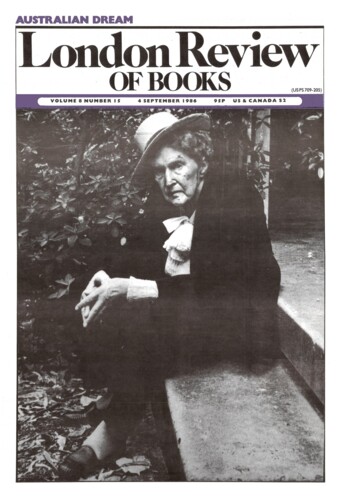Peter Porter
Peter Porter’s collection Dragons in Their Pleasant Palaces came out in 1997.
Pieces about Peter Porter in the LRB
Bad Dreams: Peter Porter
Robert Crawford, 6 October 2011
One of the greatest elegies of the 20th century was written in a flat-roofed Australian beach house beside scribbly-gums and banksias in 1975. The poem and the circumstances out of which it grew...
Davie’s Rap
Neil Corcoran, 25 January 1990
One of the finest things in Donald Davie’s Under Briggflatts is a sustained, learned and densely implicative comparison of two poems about horses: Edwin Muir’s well-known,...
Callaloo
Robert Crawford, 20 April 1989
‘Where do you come from?’ asks one of the most important questions in contemporary poetry – where’s home? Answering the pulls and torsions of that question produces much...
Every three years
Blake Morrison, 3 March 1988
Now that poetry has been brought into the marketplace, and publishers have discovered how to make a modest profit from it, and now that publication outlets can be found in any good-sized store,...
Players, please
Jonathan Bate, 6 December 1984
The Great War was the war of the great war poets. Was ‘the war to end all wars’ also the war to end all war poetry? The best part of Jon Stallworthy’s introduction to his Oxford...
Subjects
Craig Raine, 6 October 1983
My subject-matter is subject-matter. Is it true, as it sometimes seems, that certain subjects are inevitably more interesting than others, however much we may protest that they are merely...
Moving Pictures
Claude Rawson, 16 July 1981
Peter Porter’s imagination tends towards the epigram, but not quite in the popular sense which suggests brief, pithy encapsulations of wit or wisdom: Believe me, Flaccus, the epigram is...
Read anywhere with the London Review of Books app, available now from the App Store for Apple devices, Google Play for Android devices and Amazon for your Kindle Fire.
Sign up to our newsletter
For highlights from the latest issue, our archive and the blog, as well as news, events and exclusive promotions.

